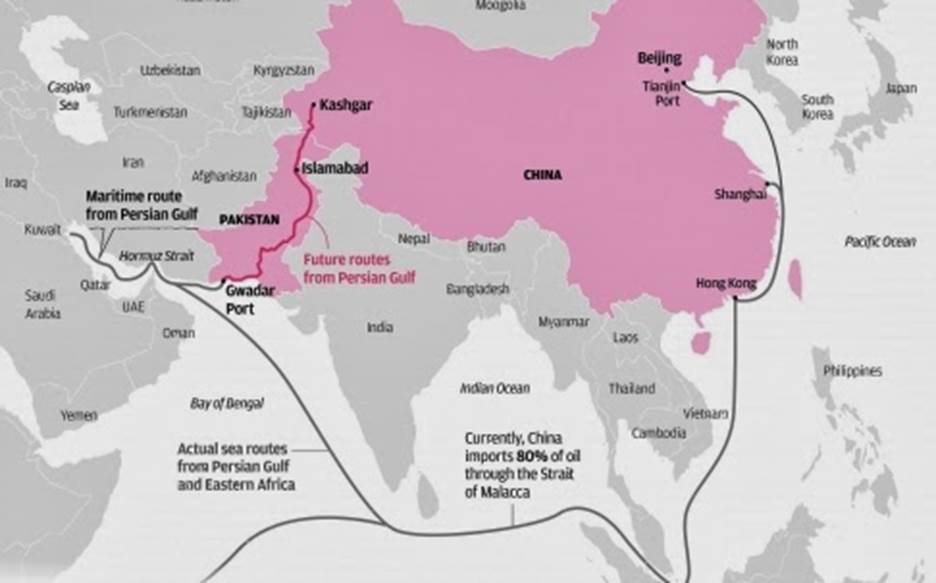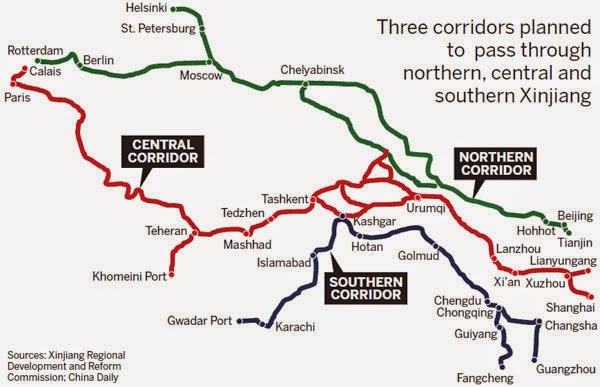
China-Pakistan: Beijing to "Further Deepen and Expand" Ties, Support Pak "Financial Stability"
By Riaz Haq
CA

Top Chinese officials have committed to “further deepen and expand” ties with Pakistan at meetings at the highest levels between the military and civilian leaderships of the two nations. Chinese Prime Minister Li Qiang assured Prime Minister Shehbaz Sharif of his country's support for Pakistan's "financial stability". Also in the news this week is a Chinese government commission report recommending the construction of a 3,000 kilometer long railway link between China and Pakistan at an estimated cost of $57.7 billion , making it the most expensive infrastructure project in the Chinese-sponsored Belt and Road Initiative (BRI) to date.
The railroad will connect Pakistan's Gwadar Port on the Arabian Sea with the western Chinese city of Kashgar in Xinjiang province. This appears to be a part of the Chinese response to the US-led Indo-Pacific strategy which Beijing sees threatening its interests in the region. Will India allow itself to be used as a US proxy against China? Will the US-China rivalry force India and Pakistan to choose sides as it plays out in South Asia? Will China's assistance now push Pakistan further into the Chinese camp?
US-India Ties
US President Joseph R. Biden is pursuing close strategic ties with Indian Prime Minister Modi. The rhetoric of "democracy" and "shared values" is often used to disguise Washington's intent to use India to counter China's rise as a global superpower. Meanwhile, China with its long land border with India has warned New Delhi that it "will be the biggest victim" of the US proxy war against China. In a recent Op Ed in Global Times, considered a mouthpiece of the Beijing government, Professor Guo Bingyun has written as follows:
"Inducing some countries to become US' proxies has been Washington's tactic to maintain its world hegemony since the end of WWII. It does not care about the gains and losses of these proxies. The Russia-Ukraine conflict is a proxy war instigated by the US. The US ignores Ukraine's ultimate fate, but by doing so, the US can realize the expansion of NATO, further control the EU, erode the strategic advantages of Western European countries in climate politics and safeguard the interests of US energy groups. It is killing four birds with one stone......If another armed conflict between China and India over the border issue breaks out, the US and its allies will be the biggest beneficiaries, while India will be the biggest victim. Since the Cold War, proxies have always been the biggest victims in the end".
US-Pakistan Ties
After assuming office as President of the United States, Joe Biden called many world leaders. But he did not bother to call then Pakistani Prime Minister Imran Khan, nor has he made a call to the current Prime Minister Shehbaz Sharif. This has sent a clear signal to Islamabad that Washington doesn't see it as important. This prompted Brookings' Bruce Reidel and Madiha Afzal to write: "Biden did not call Khan while he was prime minister. Last fall, we argued he should. Khan in turn declined to attend Biden’s Summit for Democracy. The White House should call Shahbaz Sharif".
Madiha Afzal of Brookings Institution again reminded Biden this year that "Pakistan, the fifth-largest country in the world and a nuclear-armed nation, ought to be seen by the United States on its own terms and not through the prism of its neighbors. A cold shoulder risks pushing Pakistan further toward China — which is neither an inevitable nor desirable outcome for the United States".

|
CPEC and BRI |
CPEC Transforming Pakistan
Back in 2018, former US Ambassador to Pakistan Richard G. Olson wrote in a New York Times Op Ed titled " How Not to Engage With Pakistan " that "(CPEC's) magnitude and its transformation of parts of Pakistan dwarf anything the United States has ever undertaken". Olson went on to warn the Trump Administration that "Without Pakistani cooperation , our (US) army in Afghanistan risks becoming a beached whale". Among the parts of Pakistan transformed by China Pakistan Economic Corridor (CPEC) are some of the least developed regions in Baluchistan and Sindh, specifically Gwadar and Thar Desert.

|
Source: China Daily |
Pakistan's Economic Crisis
Some blame Pakistan's current balance of payments crisis on Chinese debt taken to fund CPEC projects. Evidence does not support this. The fact is that Pakistan failed to grow its exports while its imports boomed for over 5 years on Prime Minister Nawaz Sharif's watch from 2013-2018. It forced Pakistan to seek an IMF bailout which came with its own tough conditions to compel economic reforms and greater fiscal discipline. Geopolitics has also played a role in it. The Ukraine War pushed the energy and other commodity prices higher, exacerbating Pakistan's trade deficits. At the same time, the Biden administration has shown little support for Pakistan's bailout by the IMF. China's latest commitment to support "Pakistan's financial stability" will help, pushing Pakistan further into the Chinese camp.
Here's a Wall Street Journal video on US-China Rivalry and Pakistan:
https://youtu.be/wvw-85CC1t4
(Riaz Haq is a Silicon Valley-based Pakistani-American analyst and writer. He blogs at www.riazhaq.com )

